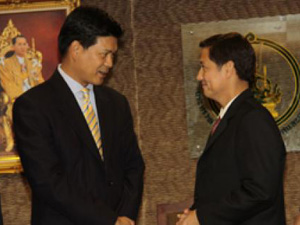



Date:05/09/11
 New Thai ICT Minister, Anudith Nakornthap recently announced the Smart Thailand Plan, to offer modern public services through high-speed internet.
New Thai ICT Minister, Anudith Nakornthap recently announced the Smart Thailand Plan, to offer modern public services through high-speed internet.
According to the minister, the group plans to utilise high-speed Internet to upgrade and modernise public services, targeting to cover some 80-85 per cent of the country.
Nakornthap plans to set up new committees to scrutinise existing contentious projects including a nationwide 3G network expansion.
The ICT ministry is working closely with the National Broadcasting and Telecommunications Commission and private telecom operators on WiFi network installation to provide free connection by the end of the year.
Collaboration with all relevant agencies are also underway to develop a common public database needed for launching the e-services for people in all Thai regions. Provinces where the e-public services will be implemented as pilot projects will be designated over the next couple of months.
Basic e-public services mainly include those facilitating district offices’ workloads on issuing identity cards for Thai nationals, household registrations and population censuses, as well as e-education, e-health and e-agriculture services.
“Once the e-public services are launched, people can access public health services in their respective area through high-speed online programs, obviating the need for those in remote areas to travel to hospitals located far away,” Nakornthap added.
ICT ministry targets Smart Thailand in 4 years
 New Thai ICT Minister, Anudith Nakornthap recently announced the Smart Thailand Plan, to offer modern public services through high-speed internet.
New Thai ICT Minister, Anudith Nakornthap recently announced the Smart Thailand Plan, to offer modern public services through high-speed internet.According to the minister, the group plans to utilise high-speed Internet to upgrade and modernise public services, targeting to cover some 80-85 per cent of the country.
Nakornthap plans to set up new committees to scrutinise existing contentious projects including a nationwide 3G network expansion.
The ICT ministry is working closely with the National Broadcasting and Telecommunications Commission and private telecom operators on WiFi network installation to provide free connection by the end of the year.
Collaboration with all relevant agencies are also underway to develop a common public database needed for launching the e-services for people in all Thai regions. Provinces where the e-public services will be implemented as pilot projects will be designated over the next couple of months.
Basic e-public services mainly include those facilitating district offices’ workloads on issuing identity cards for Thai nationals, household registrations and population censuses, as well as e-education, e-health and e-agriculture services.
“Once the e-public services are launched, people can access public health services in their respective area through high-speed online programs, obviating the need for those in remote areas to travel to hospitals located far away,” Nakornthap added.
Views: 1436
©ictnews.az. All rights reserved.Similar news
- Mobile operators of national market to reduce roaming tariffs
- Iran vows to unplug Internet
- China Targeting Telecoms in Corruption Probe
- Bangladesh to use electronic voting system for next elections
- Philippine IT sector to launch five-year digital strategy plan
- Russian Premier Vladimir Putin meets ITU Secretary-General Hamadoun Touré
- US lawmakers propose to regulate use of geolocation data
- Unlimited mobile data plans dying as telcos gear up for cloud future
- Europe at risk of falling behind US and Asia on 4G use
- Netherlands first to regulate on net neutrality
- Korean Co Takes Aim At Display Patents
- Regulators, Banks Look for IT Hires After Breakdowns
- Electron transactions spreading
- Schools in remote rural areas will connect to the single database via network without SIM
- Obama to Personally Tweet From Twitter Account





















